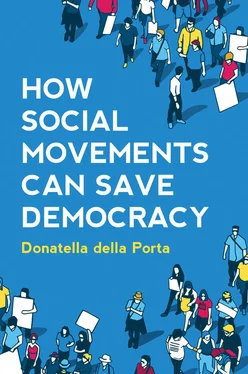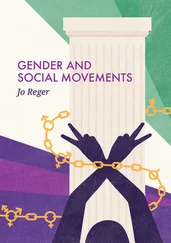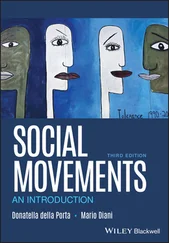1 Cover
2 Front Matter How Social Movements Can Save Democracy Democratic Innovations from Below Donatella della Porta polity
3 1. Democratic Innovations and Social Movements Democratic challenges in the Great Recession Progressive social movements as sites for innovation This volume
4 2. Crowd-Sourced Constitutionalism: Social Movements in the Constitutional Process Iceland in the crisis Expanding the analysis: the Irish deliberative constitutional process Concluding remarks
5 3. Referendums from Below: Direct Democracy and Social Movements ‘Water is not for sale’: direct democracy against the privatization of water supply Expanding the analysis from a comparative perspective: referendums in Scotland and Catalonia Concluding remarks
6 4. Movement Parties in the Great Recession Podemos as a movement party Developing a comparison: MAS in Bolivia Conclusion
7 5. Progressive Movements and Democratic Innovations: Some Conclusions Innovating from below Conditions and limits for democratic innovations Democracy and the populist Right Democratic innovations as social movement outcomes Institutional change in empirical theories of democracy Innovations in intense times: the way forward
8 Bibliography
9 Index
10 End User License Agreement
1 Cover
2 Table of Contents
3 Begin Reading
1 iii
2 iv
3 v
4 viii
5 ix
6 1
7 2
8 3
9 4
10 5
11 6
12 7
13 8
14 9
15 10
16 11
17 12
18 13
19 14
20 15
21 16
22 17
23 18
24 19
25 20
26 21
27 22
28 23
29 24
30 25
31 26
32 27
33 28
34 29
35 30
36 31
37 32
38 33
39 34
40 35
41 36
42 37
43 38
44 39
45 40
46 41
47 42
48 43
49 44
50 45
51 46
52 47
53 48
54 49
55 50
56 51
57 52
58 53
59 54
60 55
61 56
62 57
63 58
64 59
65 60
66 61
67 62
68 63
69 64
70 65
71 66
72 67
73 68
74 69
75 70
76 71
77 72
78 73
79 74
80 75
81 76
82 77
83 78
84 79
85 80
86 81
87 82
88 83
89 84
90 85
91 86
92 87
93 88
94 89
95 90
96 91
97 92
98 93
99 94
100 95
101 96
102 97
103 98
104 99
105 100
106 101
107 102
108 103
109 104
110 105
111 106
112 107
113 108
114 109
115 110
116 111
117 112
118 113
119 114
120 115
121 116
122 117
123 118
124 119
125 120
126 121
127 122
128 123
129 124
130 125
131 126
132 127
133 128
134 129
135 130
136 131
137 132
138 133
139 134
140 135
141 136
142 137
143 138
144 139
145 140
146 141
147 142
148 143
149 144
150 145
151 146
152 147
153 148
154 149
155 150
156 151
157 152
158 153
159 154
160 155
161 156
162 157
163 158
164 159
165 160
166 161
167 162
168 163
169 164
170 165
171 166
172 167
173 168
174 169
175 170
176 171
177 172
178 173
179 174
180 175
181 176
182 177
183 178
184 179
185 180
186 181
187 182
188 183
189 184
190 185
191 186
192 187
193 188
194 189
195 190
196 191
197 192
198 193
199 194
200 195
How Social Movements Can Save Democracy
Democratic Innovations from Below
Donatella della Porta
polity
Copyright © Donatella della Porta 2020
The right of Donatella della Porta to be identified as Author of this Work has been asserted in accordance with the UK Copyright, Designs and Patents Act 1988.
First published in 2020 by Polity Press
Polity Press
65 Bridge Street
Cambridge CB2 1UR, UK
Polity Press
101 Station Landing
Suite 300
Medford, MA 02155, USA
All rights reserved. Except for the quotation of short passages for the purpose of criticism and review, no part of this publication may be reproduced, stored in a retrieval system or transmitted, in any form or by any means, electronic, mechanical, photocopying, recording or otherwise, without the prior permission of the publisher.
ISBN-13: 978-1-5095-4128-7
A catalogue record for this book is available from the British Library.
Library of Congress Cataloging-in-Publication Data
Names: Della Porta, Donatella, 1956- author.
Title: How social movements can save democracy : democratic innovations from below / Donatella della Porta.
Description: Cambridge, UK ; Medford, MA : Polity, 2020. | Includes bibliographical references and index. | Summary: “Leading political sociologist della Porta rehabilitates the role social movements have long played in fostering democracy. Bridging social movement studies and democratic theory, she investigates contemporary innovations of the progressive Left in times of crisis and reflects on the potential and limits of such alternative politics”-- Provided by publisher.
Identifiers: LCCN 2019029694 (print) | LCCN 2019029695 (ebook) | ISBN 9781509541263 (hardback) | ISBN 9781509541270 (paperback) | ISBN 9781509541287 (epub)
Subjects: LCSH: Social movements--Political aspects. | Direct democracy. | Right and left (Political science)
Classification: LCC HM881 .D46 2020 (print) | LCC HM881 (ebook) | DDC 303.48/4--dc23
LC record available at https://lccn.loc.gov/2019029694LC ebook record available at https://lccn.loc.gov/2019029695
The publisher has used its best endeavours to ensure that the URLs for external websites referred to in this book are correct and active at the time of going to press. However, the publisher has no responsibility for the websites and can make no guarantee that a site will remain live or that the content is or will remain appropriate.
Every effort has been made to trace all copyright holders, but if any have been overlooked the publisher will be pleased to include any necessary credits in any subsequent reprint or edition.
For further information on Polity, visit our website: politybooks.com
To Alessandro Pizzorno, amico e maestro , in memoria
This volume is based on the assumption that democratic conceptions and practices need constant innovation. In a moment in which various crises converge in challenging existing institutions, it is all the more important to reflect on what can be done in order to save democracy. Progressive social movements have historically been carriers of democratic deepening, elaborating and prefiguring alternative visions that have often then been constitutionalized in democratic institutions. In a period in which attacks on democracy come from the populist Right, research on attempts to improve democratic institutions through increased participatory and deliberative qualities is most important.
Looking at some of these attempts, with a critical view aimed also at singling out existing limits and conditions for improvement, is my purpose. In this sense, this volume can be seen as building upon and developing some of my previous contributions on related issues: first and foremost in Can Democracy Be Saved? (Polity 2013) and Social Movements in Times of Austerity: Bringing Capitalism Back into Protest Analysis (Polity 2015), but also in Movement Parties against Austerity (Polity 2017), Late Neoliberalism and its Discontents in the Economic Crisis: Comparing Social Movements in the European Periphery (Palgrave Macmillan 2016) and Social Movements and Referendums from Below: Direct Democracy in the Neoliberal Crisis (Policy 2017).
Читать дальше












